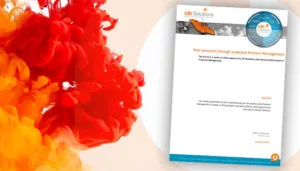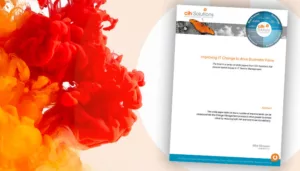
In this paper Mike Walker, our Technical Director identifies five ways to make your Cherwell system last longer. Following the acquisition of Cherwell by Avanti we know many existing Cherwell customers have considered what they should do next. So, whether you’re sticking with Cherwell, or just need to buy some time to consider your options it makes sense to sweat the asset as much as possible.
Ivanti’s purchase of Cherwell in March 2021 has left Cherwell customers with some decision-making to do.
Ivanti is stating that it plans to continue updating and supporting Cherwell, while integrating it more closely with its own systems, with an ongoing communication on convergence and migration for Cherwell customers. Cherwell will become more closely converged with Ivanti products, but does this head in a direction that no longer provides the right functionality for your organisation.
Whatever happens, you should take some time to decide whether sticking or twisting is the right thing for your business. We’ll publish more articles in the future that will help you to make those decisions – as there is more clarity from Ivanti.
But, in the meantime, if you’re sticking with Cherwell, or just need to buy some time to work out your next best move, here are our five tips for making your system last longer.
1. Do some basic housekeeping
Many businesses allow their system to expand organically without keeping a check on it, particularly in terms of the data being recorded and stored. An example is allowing a list of records to accumulate – frequently without consideration of what you can and should keep with reference to GDPR.
We’ve seen customers with 2 terabytes of data stored in their databases. This is often caused by storing every single email, which frequently have a footer with a company logo on it and various other attachments, so you may end up with dozens of copies of that image on a single ticket.
To alleviate this problem, and to make your system run faster for longer, we would always recommend setting up rules about what records can be disposed of after a period of time, while also being wary of the consequences of deleting records that the system is dependent on.
The good news is that this kind of good housekeeping shouldn’t take too long and can be automated once you have your rules in place.
2. Carry out performance monitoring and reviews
Tied in with housekeeping, there are some helpful tools that will examine your instance of Cherwell and provide recommendations on how to optimise it. Some of these are standard Cherwell utilities, while others have been developed by third parties, such as ourselves.
An example result would be a recommendation of how to optimise the database, perhaps by reducing the number of queries it has to run by making changes to the way the relationship between records are formed.
Following such recommendations will give increased performance, so the end-user experience will be better, and also help to extend the life of your system.
Although it’s relatively easy to run the monitoring tools, sometimes interpreting the recommendations and reading the performance metrics can be tricky. In that case, it’s often best to make sure this is done by people with a high level of technical skill.
To alleviate this problem, and to make your system run faster for longer, we would always recommend setting up rules about what records can be disposed of after a period of time, while also being wary of the consequences of deleting records that the system is dependent on.
The good news is that this kind of good housekeeping shouldn’t take too long and can be automated once you have your rules in place.
3. Upgrade the system to a recent version
Make sure you upgrade your Cherwell to a stable and well-supported version. A lot of companies are running on older, unsupported versions – and that’s often because the upgrade process can be tricky.
However, we believe it can be worth going through this relatively small amount of pain if it means getting extra years out of your system.
One issue you may encounter is that if you’re on Version 9 of Cherwell, for example, and want to upgrade to a future Version 11 or 12 – if and when they are released – you may find that only upgrades from Version 10 will be supported. Alternatively, when Ivanti converge Cherwell with the Neurons product you will also only be able to go there from Version 10.
Another advantage of upgrading is that it’s a golden opportunity to take a look at your system in a lot of detail – something you may not have done before. This can help you to get control of it, optimise it and also be ready to migrate it if and when you decide to replace it.
4. Document the system – and have an exit plan just in case
Really getting to grips with your system, and asking some key questions, is perhaps an obvious action – but you’d be surprised how many of our customers haven’t done this and have just left things to drift over the years.
Ask fundamental questions such as: What does it do? What processes is it supporting? What are the internal workflows within the system? What does it integrate with?
Just having a good understanding of the above, and acting on the information you gather, can give you the opportunity to sweat your asset for another few years.
It’s also helpful to do this if you think you might end up having to migrate your system in the foreseeable future. Better to do the documentation now, than have an ‘oh s**t’ moment later on when you might not have time to work things through properly.
5. Get a health check
This would involve doing a lot of the above, especially performance monitoring and reviewing the recommendations. It would also include a deep dive into your specific instance of Cherwell, what’s been configured well and not so well, and how the system can be improved both from a user experience and performance perspective.
CIH offers exactly this service, and we’ll give you a roadmap for improving any of the issues we’ve identified.
If this sounds like it could be of value to your organisation – or if you’d just like a free-of-charge no-strings chat about where to go next if you’re a Cherwell user – Get in touch with us now .
Another advantage of upgrading is that it’s a golden opportunity to take a look at your system in a lot of detail – something you may not have done before. This can help you to get control of it, optimise it and also be ready to migrate it if and when you decide to replace it.



